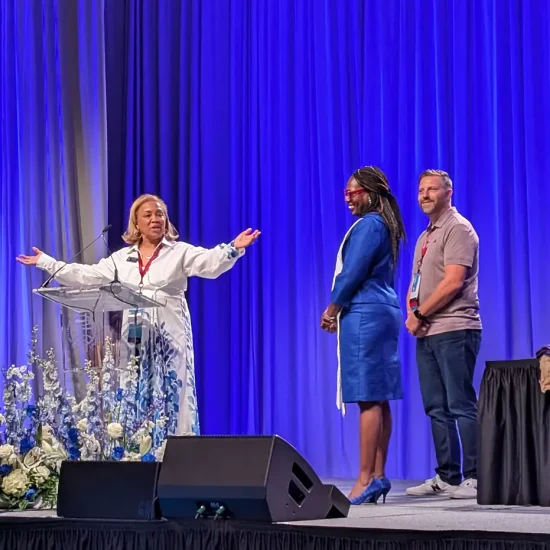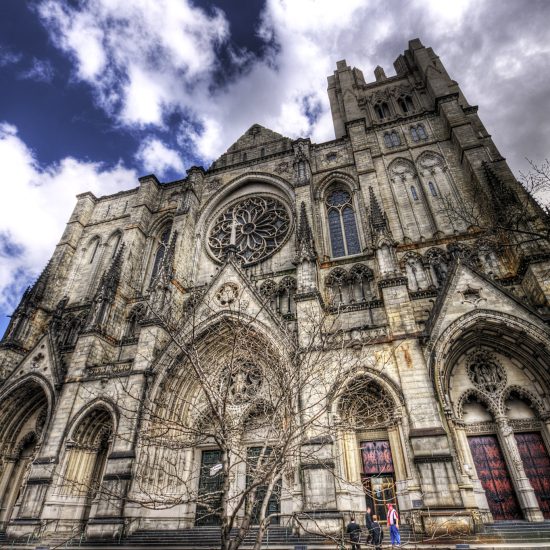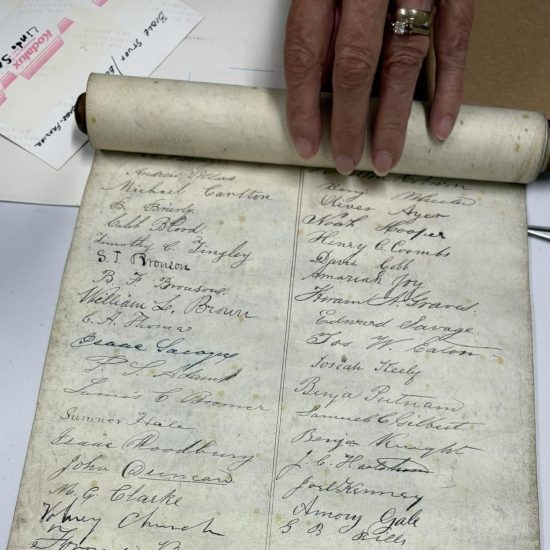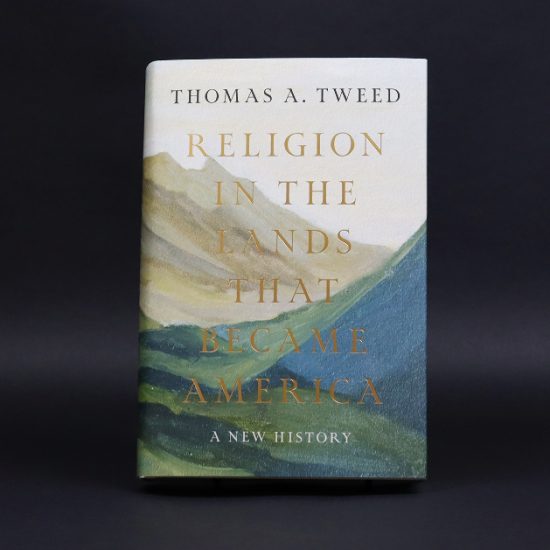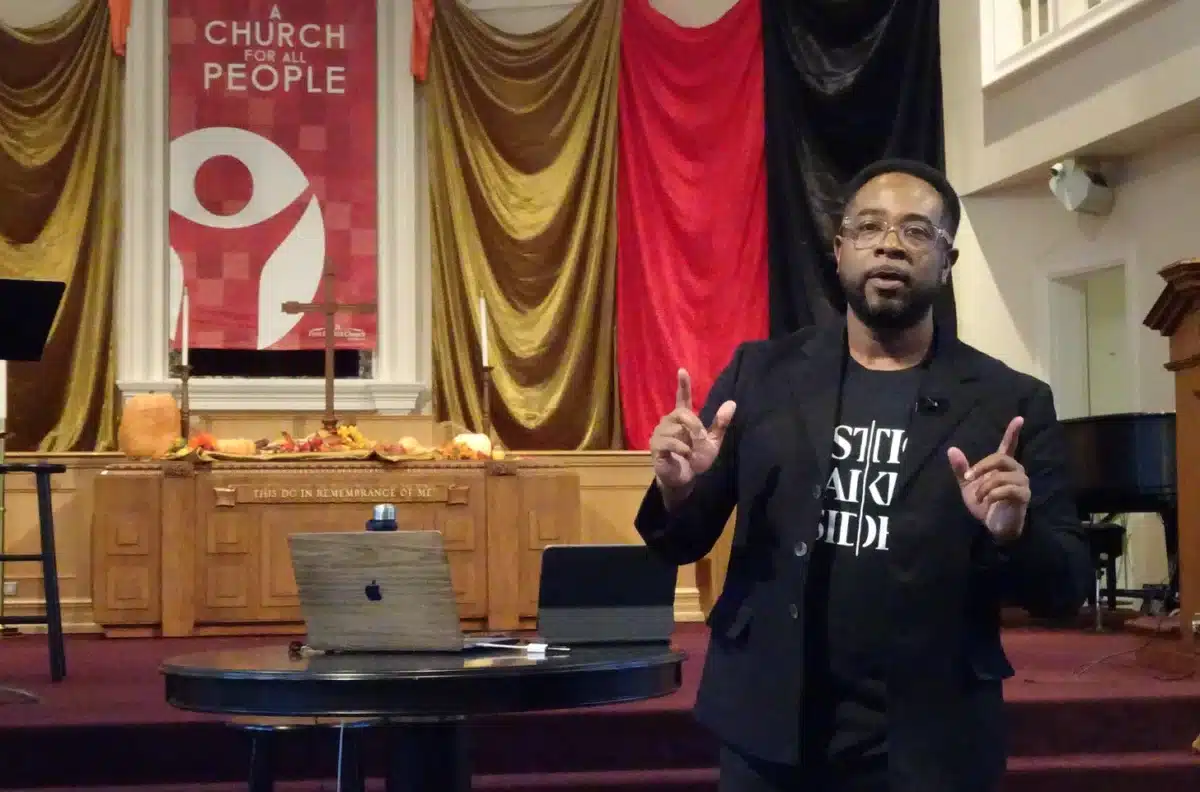
“If I could get all the White Christians in the room — all of you, all together — and I could teach you one thing, it would be that racism is not solely an issue of attitudes or interpersonal relationships, but racism has its doing in institutional manifestations.”
Historian and bestselling author Jemar Tisby made that declaration as he spoke Saturday (Oct. 14) in a room of mostly White Christians. Speaking at First Baptist Church in Columbia, Missouri, as part of the church’s 200th anniversary celebration, Tisby encouraged the congregants to take institutional steps toward fighting racism.
Since racism has institutional manifestations, Tisby explained that “therefore we need to operate not only on the individual and interpersonal level but also on the systemic, institutional level.” Such an understanding of racism, however, is not always well received.
“That’s controversial for a lot of people. That’s what they’re arguing against when they cry ‘critical race theory’ or ‘wokeism,’” said Tisby as he wore a “Justice Takes Sides” shirt that he sells. “They don’t want to deal with the systemic aspects of racism, that we got to change the curriculum, that we have to fix gerrymandered districts, that we have to redistribute financial resources.”
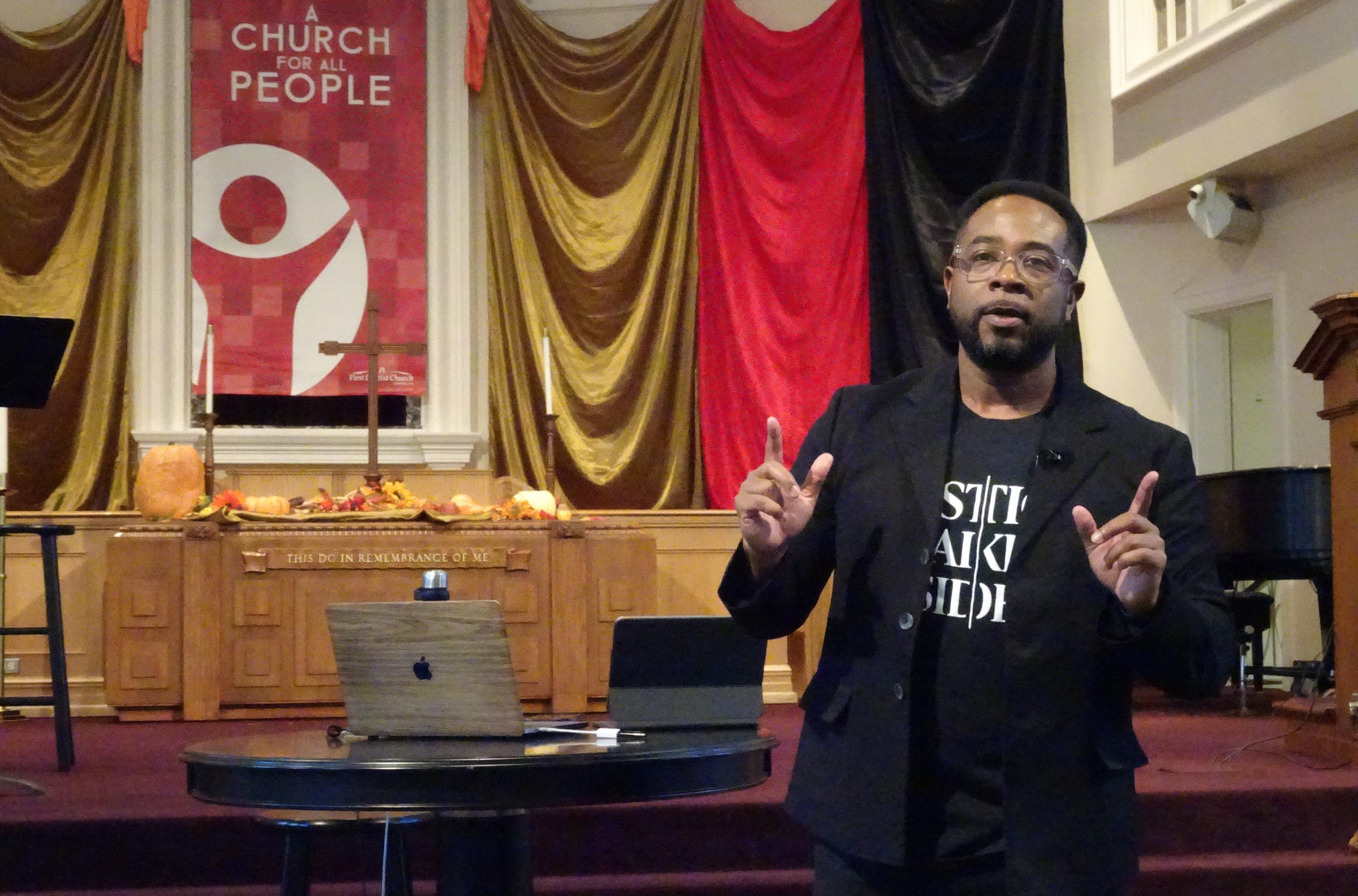
Jemar Tisby speaks at First Baptist Church in Columbia, Missouri, on Oct. 14, 2023. (Brian Kaylor/Word&Way)
A historian, Tisby recently started teaching at Simmons College of Kentucky, a historically Black school in Louisville founded by formerly enslaved Black Baptists. He’s the author of The Color of Compromise: The Truth about the American Church’s Complicity in Racism and How to Fight Racism: Courageous Christianity and the Journey Toward Racial Justice — and he writes regularly at his Substack newsletter Footnotes. He also knows firsthand how controversial it can be to talk about systemic racism.
Last year, trustees at a Christian college in Pennsylvania investigated ways they felt the school experienced “mission drift” from being “a Christ-centered, conservative institution.” The key example they criticized at Grove City College was Tisby speaking during a chapel service in 2020. Trustees called the invite a “mistake” and accused him of espousing “critical race theory” they argued was unbiblical.
This year, two English professors at Christian colleges — one at Palm Beach Atlantic University in Florida and another at Taylor University in Indiana — lost their jobs for their class discussions on race, with critics highlighting their use of writings by Tisby. This backlash — or what some call a “Whitelash” — is precisely the kind of response that Tisby the historian traced in his book The Color of Compromise.
But while Tisby is canceled from many conservative White Christian spaces, other Christians are willing to listen. So this issue of A Public Witness takes you to Dr. Tisby’s special class session on Saturday to learn about the need for White Christians and churches to fight institutional racism.
Get cutting-edge reporting and analysis in your inbox every week by subscribing today!
No Quick Fix
As Tisby talked about racism and racist terrorist violence in the U.S. today, he encouraged those present to not seek “the quick fix.”
“So often, when we think about fighting racism, we’re looking for the big thing, the single cause we can protest, the dramatic gesture,” he said. “But lasting change most often happens in small, consistent acts of courage. And I encourage you to keep going one step at a time. It took us centuries to get here. It’s going to be a long time for us to continue.”
“So we have to shift our mindset from seeing racial justice as some sort of a reaction or a one-time action; we actually have to think of it as a journey,” he added. “It’s a lifelong process. In different seasons of life, you are going to be learning and relearning different aspects of racial justice.”
Thus, Tisby talked about various ways of fighting racism that involved growing in awareness and building relationships. But, he insisted, such efforts must also include “committing to changing the laws and policies and practices of the systems and institutions that create and perpetuate racial inequality.”
“A lot of White Christians in the United States struggle to understand the systemic dimensions of racism. It’s always interpersonal,” he added.
Tisby used Arkansas as an example of the current push to squash conversations about systemic racism. He pointed to the recent last-minute decision by state officials to pull the plug on AP African American Studies being taught in public schools. Some schools are pushing forward with the course anyway with their own funding — including Central High School in Little Rock that was the site of the 1957 desegregation standoff included in the course! Such systemic efforts to block the teaching of history, Tisby argued, prove the need to address racism at levels beyond interpersonal relationships.
“We know the importance of building our awareness of racial justice because it’s being actively opposed. It’s getting harder, not easier, to learn the history and the methodologies and the theories that would help us understand race and racism and White Supremacy. That’s why we have to be serious about growing our awareness of these issues,” he said. “Once you see this stuff, you can’t unsee it.”
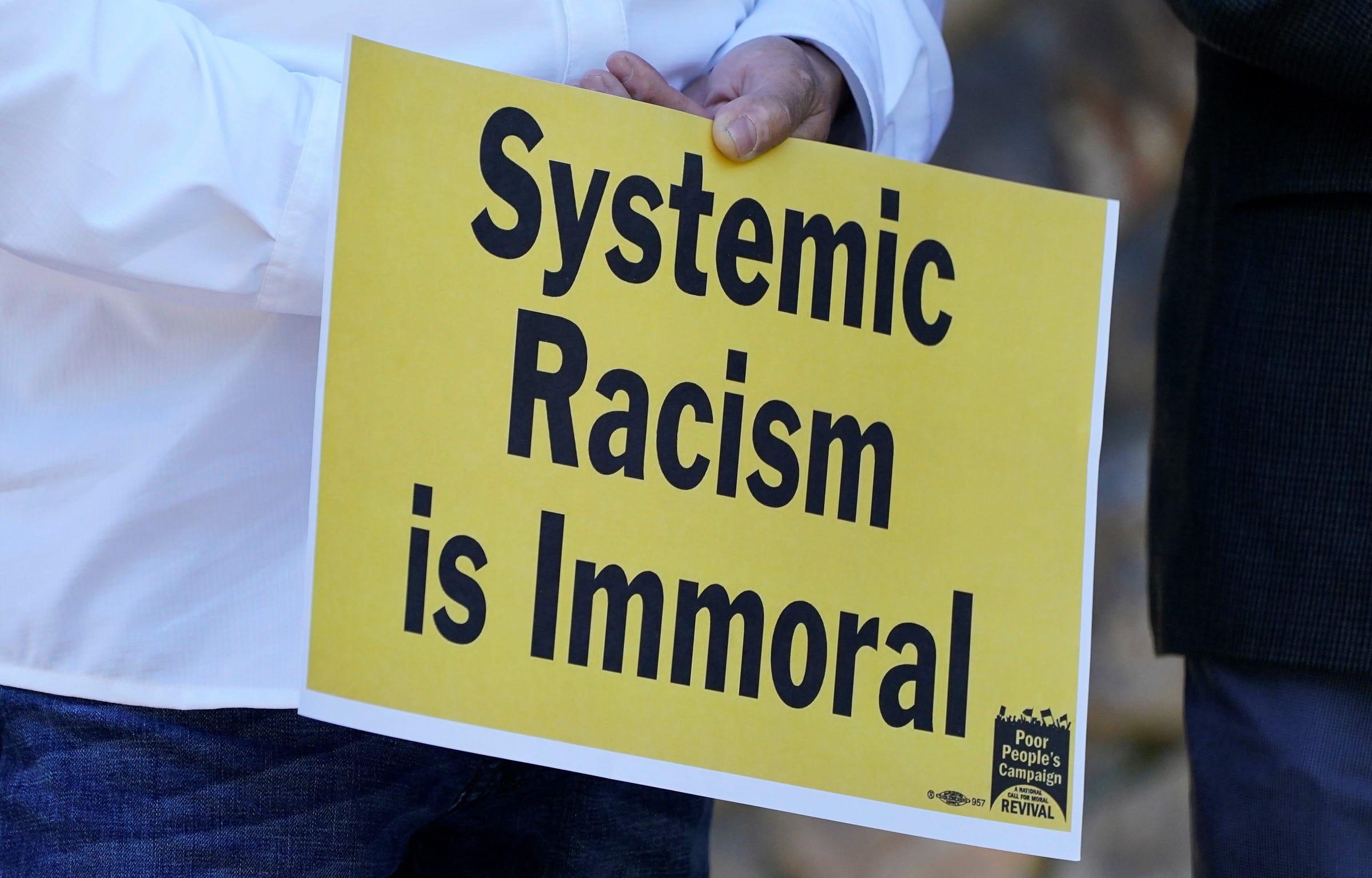
Pastor Jose Rodriquez holds a sign against systemic racism during a Poor People’s Campaign assembly in Jackson, Mississippi, on April 19, 2021. (Rogelio V. Solis/Associated Press)
So Tisby encouraged the congregants to consider systemic racism in places they participate, including in Christian settings.
“What about the institutions you’re dedicating your time to? What a wonderful time right now as we’re looking at the 200th anniversary of this church to look back on the history of the church as an organization, as an institution — some of which I understand has already happened and is happening.”
Tisby alluded to the fact that First Baptist has been researching its ties to slavery and naming that as a sin during its telling of its history this year.
Churches, Tisby argued, could learn from efforts occurring in higher education. He pointed out efforts by schools like the University of Virginia, Princeton University, and University of Mississippi to study their institutional ties to slavery. He noted that the schools even work together through the Universities Studying Slavery Consortium to share ideas for research and memorialization.
“What I love about it is they were able to share best practices. They were able to share findings,” he said. “And then I started thinking about the church. What if we had something like the Churches Studying Slavery Consortium?”
“What I’m seeing now is everybody’s kind of doing their own thing, they’re trying to make progress on this in terms of institutional history, they’re looking back at their own churches,” he added. “What if we gathered together in a region or a denomination to say, ‘Hey, here’s what we’re discovering, here’s how we’re going about it, here’s how we’re acknowledging the truth of the past. What are you doing?’ And we’re sharing and we’re collaborating and we’re going to do it better together and moving further together.”
Repairing the Damage
Tisby said that when working for systemic change, “one of the things we got to think about is money. We don’t like to talk about that, especially in church!”
Mentioning that he teaches at a school designated as one of the Historically Black Colleges and Universities, Tisby shared data about the financial health of the nation’s HBCUs versus historically White schools. While Harvard University has an endowment of over $50 billion, the largest HBCU endowment is that of Howard University at just $875 million. In fact, Tisby added, there are more historically White schools with an endowment of more than $1 billion — 142 — than there are total HBCUs (107). HBCUs have been significantly underfunded as “even publicly-funded HBCUs were not funded according to their own state laws.”
Such underfunding also occurred for Christian colleges. Tisby said that when Simmons College of Kentucky “started as a dream of a group of Black Baptist pastors in Kentucky” after the Civil War, “those Black Baptist pastors didn’t have social networks of people who have millions of dollars.” But some White Christian schools did have networks of wealthy donors, “many of whom acquired their wealth through slavery, convict leasing, labor exploitation.”
That massive wealth disparity, Tisby said, requires “the only other ‘r’-word more controversial than racism.” Reparations.
“As we sit here in 2023, how is just knowing about this problem going to help? How is getting together and having a heart-to-heart over a cup of coffee and building a relationship going to help?” he explained. “What needs to happen is a systemic addressing of the issue. Laws need to be changed. Resources need to be shifted and shared.”
“Reparations are not a matter of charity; reparations are a matter of justice,” he added.
He suggested that if people have a problem with writing checks to individuals, then reparations could go to institutions like HBCUs that have already proven themselves effective. (In the case of Simmons, a group of Louisville pastors in 2019 urged Southern Baptist Theological Seminary, which was founded by enslavers, to pay reparations to the cross-town Baptist school started for Black pastors who were barred from the all-White seminary. But Southern President Al Mohler sharply rejected the call.)
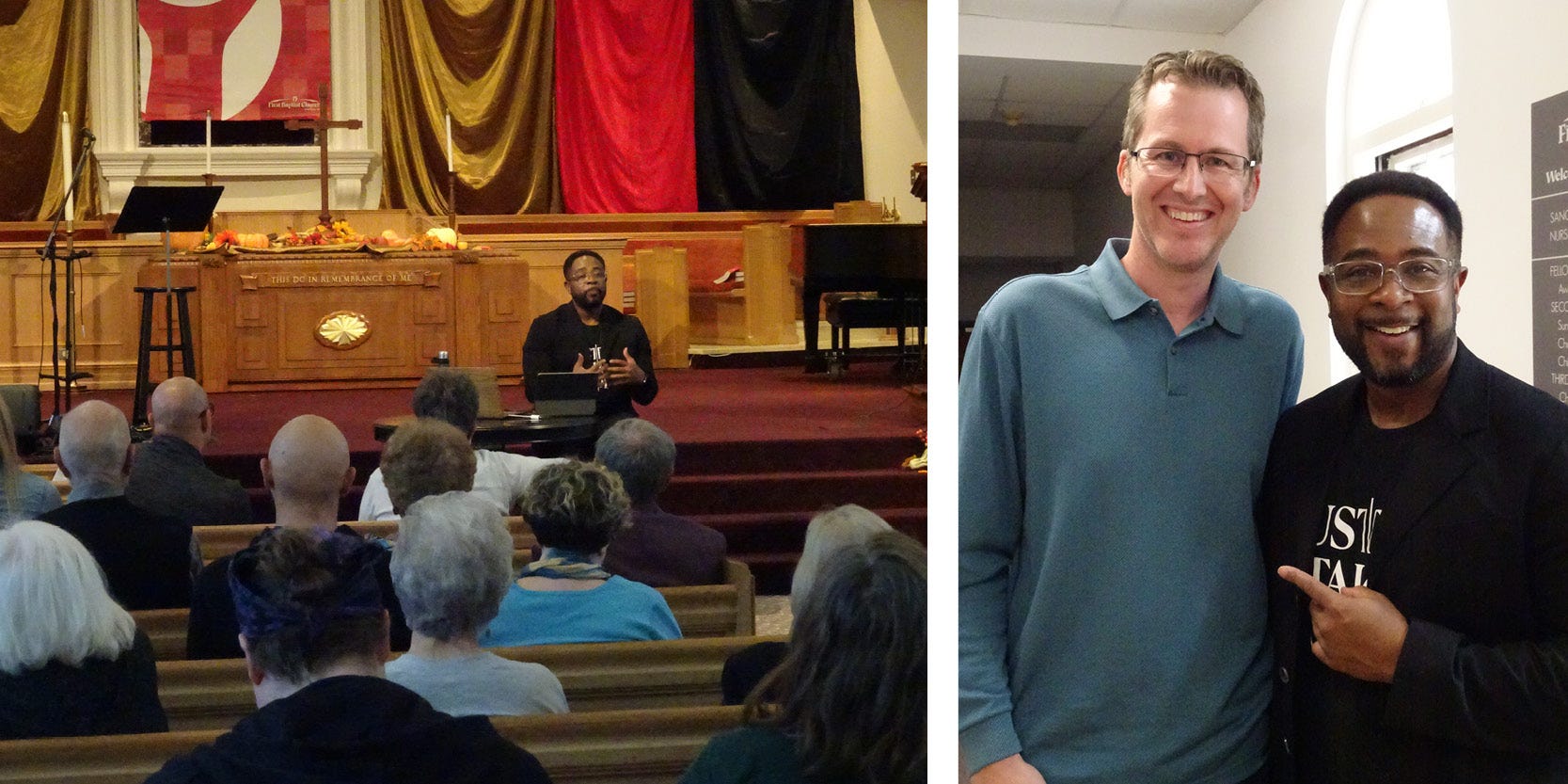
Left: Jemar Tisby speaks at First Baptist Church in Columbia, Missouri, on Oct. 14, 2023. Right: Brian Kaylor and Jemar Tisby. (Word&Way)
Tisby also argued people didn’t have to wait for a government effort to start repairing the damage.
“Guess what, church, you don’t have to wait for anyone else,” he said. “You never need permission to do the right thing. We don’t need to wait on a federal or a state law that makes reparations legal or standard practice. The body of Christ can get together on its own as a congregation, a denomination, a consortium and say we’re going to do it.”
Whether it comes to reparations or other racial justice initiatives, Tisby insisted we know ways of making progress. The real need is for more people to decide they want to fight racism.
“When it comes to racial justice, we don’t have a how-to problem,” he added. “We have a want-to problem.”
As a public witness,
Brian Kaylor
By the way, you can hear more from Jemar Tisby in his 2022 Dangerous Dogma interview.

